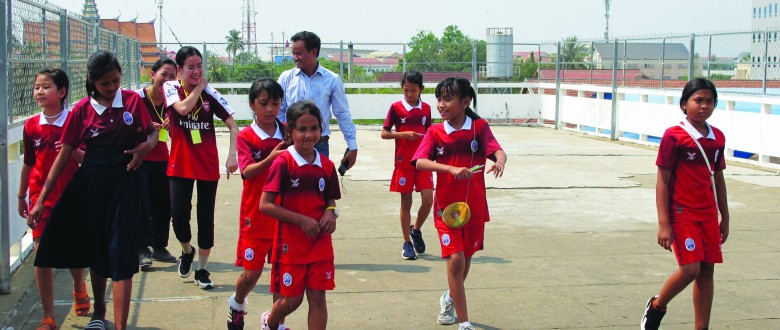
Education is the key to empowering women, but in Cambodia school-related gender-based violence is a serious obstacle to girls’ education. Teachers, teacher trainers and school leaders are potential drivers of change. They can instill in their learners the concepts of gender equality and non-violent behaviour, thus transforming attitudes towards girls.
Samphon Say (pictured above and below) has been working with VVOB in Cambodia since 2014 as a programme coordinator and a facilitator of professional development trajectories for school leaders. He wants equal opportunities for both his son and daughter.
Female role models
What would have to change in Cambodia for your daughter to have the same opportunities as your son?
Samphon Say: "Girls are not encouraged to become managers or engineers. Society makes them feel they need to take care of the children. Consequently, women assume they’re not equipped to take up leadership roles. This competence is not equally stimulated in boys and girls. These gender expectations influence the way teachers approach young girls, which is different from how they approach boys.
Authority figures like school leaders or directors at a Teacher Education College (TEC) are held in high regard and are therefore strong players for changing this tradition. That’s why VVOB’s starting point is to strengthen these school leaders. And in classrooms, teachers should stimulate learners equally in all subjects so that, when they grow up, they will feel equally confident."

We know people’s beliefs can stand in the way of real change. What is your approach to tackling teachers’ gender biases?
"It’s not easy to change beliefs. But people can change when confronted with evidence. There’s a Chinese saying: “Hearing a hundred times, is not as good as seeing once.” We can provide as much training as we want, but if they’re only listening, it won’t be enough. People need to see that something is possible in their own context. Therefore, we need successful female role models, to show what women and girls can do and to be able to start a conversation about gender."
Guides for action
How will you capacitate drivers of change in the education system to ensure a gender-responsive pedagogy?
"At the moment, VVOB is working with a team of ministry officials and TEC staff to provide training and coaching to teachers and school leaders on changing gender stereotypes. We’re creating training materials that are gender-responsive in language and instructions.
We want to turn teachers into role models. School leaders are crucial in motivating teachers to address gender biases. In turn, teachers encourage their students to look out for gender stereotypes in textbooks – such as a depiction of more men than women in management positions, or more women than men doing household chores – and discuss these issues."
"To this end, VVOB develops action guides for schools and TECs to promote gender equality. These include guidelines on using gender-responsive language, teaching and learning materials, classroom set-ups, and school policies and facilities. Teachers will also find tips to organise teaching and learning activities where boys and girls can participate equally and have equal responsibilities. Teachers are stimulated to observe each other and look out for gender-responsiveness.
By the end of VVOB’s current projects in Cambodia in 2021, school leaders will be able to observe teachers and provide feedback on gender-responsiveness. The teachers and teacher trainers will have the knowledge and skills needed to promote gender equality in education, using the action guides. The established gender-responsive schools will be models of good practice that help inspire other schools and TECs with visits and video material, and that lobby the ministry."
Gender from an early age
What is the ultimate dream you have for your daughter and country?
"I want to see girls and boys have the same opportunities in all fields of life. I wash the dishes at home. This way my daughter and son can see with their own eyes that it’s not just the responsibility of the wife. I saw a picture my daughter drew in school which clearly showed she already has a kind of stereotype: the mother is cooking. These things start from a very young age. That’s why we should be very sensitive of role models. She didn’t know what my job is, so with gender in mind, I answered: “I take care of the baby.” In the textbooks we should also show women as doctors and engineers, and at the same time men cooking at home."
This interview was featured in our annual report of 2017: Tackling barriers to education for all. You can read more about how we do this in our other partner countries in our full report.




